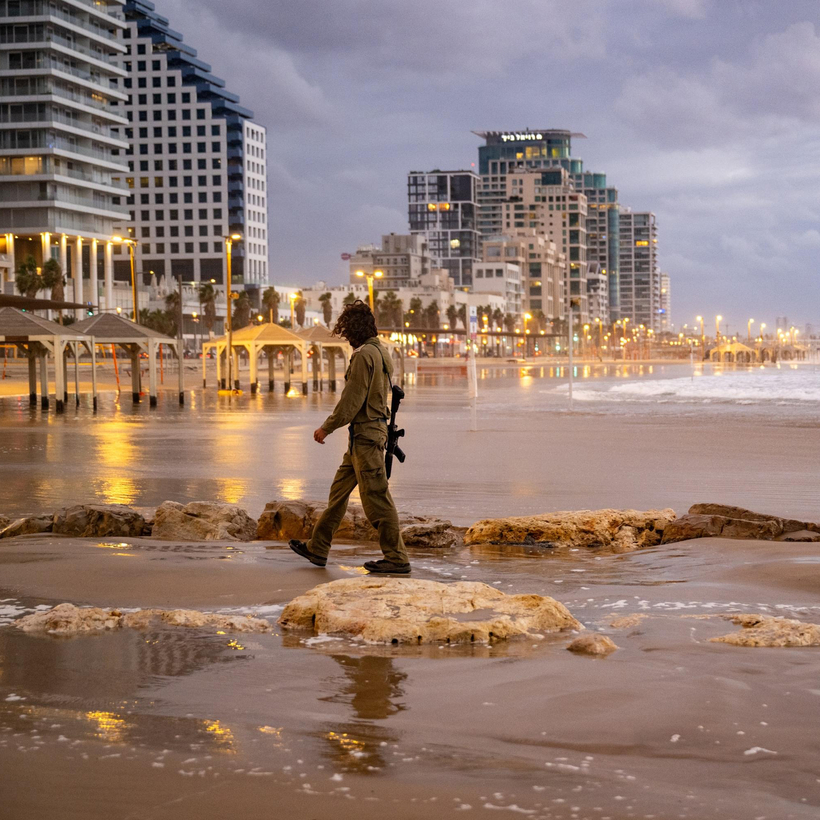Morgan Mondolini’s 44-room hotel, in Tel Aviv, was almost fully booked on Saturday, October 7. He wasn’t fazed when he woke up to the sound of sirens used to warn residents to take shelter in case of a possible attack. Those have been a fixture of Israeli life for decades.
It was only when he arrived at his property, the Elkonin, that the enormity of events became clear: a terrorist attack by Hamas had claimed at least 1,139 lives and led to the capture of around 240 hostages. Bar Tomer, the hotel’s H.R. coordinator, was among the victims. “She wasn’t answering calls around 10 o’clock, but we just hoped she’d lost her phone in the panic,” says Mondolini. Then her family confirmed that she had been at the Supernova music festival, and after one agonizing week, a DNA test confirmed that she was dead. By the end of the weekend, the Elkonin had emptied of visitors, and employees spent most of their time sheltering in the basement.

For the past four months, the war in Gaza has dominated conversations around the world, but one of its lesser-known aftershocks is the hollowing out of an industry vital to Israel’s economy: tourism.
In 2019, the country, which has a population of more than nine million, welcomed 4.55 million visitors, a record high. Projections for 2023 were even more hopeful, with three million arrivals during the first nine months alone. Of those, 57 percent were first-time visitors, half were Christian, and almost a quarter were Jewish. Together, they flooded the economy with almost $5 billion.
But overnight, demand for hotels, tours, and restaurant reservations evaporated. Flight schedules were slashed, and only El Al, Israel’s national airline, was operating a regular schedule. “Everyone knows that tourism is the first [industry] to suffer [in times of conflict], and the last to come back,” says Ben Julius. His company, Tourist Israel, organized trips for 150,000 people in 2023 before business evaporated. “Tourism only returned to Israel after [the coronavirus], in the middle of 2022, so we were finally getting to some kind of normalcy,” he says. “October was supposed to be the best month we’d ever had.”

Lyana Rotstein, a tour guide in Tel Aviv, saw a similar impact. “I’ve not worked a day since October 7, and have not had income since then,” she says. The last client she worked with was an 80-year-old widow of an American diplomat who came to Israel with her pastor for an extended trip throughout the country that she called her “life’s dream.” On the evening of October 7, however, Rotstein escorted them across the border to Jordan for the only flight home they could get.
The weekend of the Hamas attacks was a logistical nightmare for all Israelis. Yaron Liberman, the general manager of the Norman hotel in Tel Aviv, spent much of the day as a de facto taxi driver, ferrying his guests to the airport. “By the end of the day, we only had three or four guests,” he says. “And they were Israelis staying with us while they were renovating their houses.”
Over the next few weeks, many stores and restaurants closed temporarily. When it became clear that the war in Gaza would continue, the tourism and hospitality industries had to adapt. Overseas visitors aren’t filling the cafés and restaurants, but locals have filled the void. “That’s the thing—the enemy wants to paralyze your life,” says Liberman. Rotstein’s husband, a wedding photographer, saw his business return a month or so after the attacks. “People are reclaiming their lives. We have to live, the economy has to work,” she says, “If you haven’t adapted, people say to you, ‘You’re still in the October 6 mindset.’”

The Israeli government rolled out an aid package directed at the travel industry, which is still reeling from the pandemic. It includes a compensation scheme, but it hasn’t helped Rotstein, since it relies on a formula based on loss of immediate income but does not offset refunded deposits on things such as tours and hotel reservations.
As Israel came back to life, many hotels in Tel Aviv were re-purposed as dormitories for displaced Israelis, including Mondolini’s Elkonin. Now its stylish rooms are occupied by refugees from areas adjacent to Gaza and Lebanon. The government covers the cost, of around $270 per person per day, which must include fully kosher board and lodging. But since the Elkonin is not kosher-certified, Mondolini can charge around $135—approximately 25 percent of his typical nightly rate. Additionally, he’s short-staffed; of his 80 employees, 10 have been conscripted into the Israel Defense Forces. “I don’t sleep at night, thinking about them,” he says.
One bar owner, who asked not to be named, reopened his property on October 9. “We do feel the war, and, sure enough, people are spending less, but this isn’t a war zone,” he says. “It’s not the first time we’ve had rockets on Tel Aviv.”

Local businesses benefited from spending by wealthy Israelis, who stayed at home during the Christmas holidays instead of flying to Europe to ski. Many made that choice not because of the flight scarcities but out of concern for their safety abroad, given the rise of anti-Semitism.
Still, Julius is cautiously hopeful for the future. He said that the first week of January saw 100 percent more booking volume than the prior month—albeit from record-low levels in December. Low-cost airlines will gradually increase service; Ryanair’s schedule resumed on February 1. “Some people coming to Israel now say [the war] almost feels worse when you’re far away,” he says. A few foreigners have started to trickle back in, mostly so-called solidarity tourists such as Jerry and Jessica Seinfeld, who come to show support for the Israelis and, in some cases, volunteer to help with those displaced by the conflict.
Room rates at Tel Aviv’s top hotels are remarkably low. The Jaffa, a luxurious, 120-room property with 32 residences, which is owned by Aby Rosen’s RFR Holding, has availability in February for around $400 a night, as does the oceanfront Ritz-Carlton, Herzliya.

In an increasingly conflict-ridden world, war and tourism are likely to coexist more closely than ever. Israel’s experience over the last few months offers insights into how other countries might soon need to adapt. It’s reassuring, then, to see the resilience of the industry and the Israeli people.
Mondolini remembers the moment he knew that daily life was resuming: a quiet winter day when Tel Aviv was empty of tourists, and the roads were eerily quiet. “And then I heard the horns—Israelis have a very Middle Eastern way of driving,” he says with a laugh. “And that’s when I said to myself, O.K., we’re coming back.”
As he says, Mark Ellwood focuses on “froth in all its forms.” He is also a columnist for Bloomberg Pursuits, the creator and a co-host of Bloomberg’s Travel Genius podcast, and the author of Bargain Fever: How to Shop in a Discounted World


